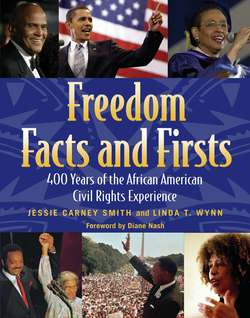Читать книгу Freedom Facts and Firsts - Jessie Carney Smith - Страница 41
На сайте Литреса книга снята с продажи.
Hughes, James Langston (1902–1967)
ОглавлениеLangston Hughes was born February 1, 1902, in Joplin, Missouri, and died May 22, 1967, in New York City. Hughes’s body of work, written in various genres, led to his being the most versatile African American writer of his day. Using free verse, black music, dialect, and prose, Hughes depicted black pride and life in America with candor, humor, and deceptively simple language. Through his writing and creation of characters, he pointed out the injustices in society and sought to effect social change and fair treatment for all people. His work is devoted to the grass-roots characters in both urban and rural America.
In the 1920s, Hughes became a voice in the Harlem Renaissance, one which espoused the manifesto of the period that called for race pride and artistic independence. In the 1930s, he wrote some leftist poetry that seemed pessimistic about America, such as Good Morning Revolution (1937), which would cause him trouble during U.S. Senator Eugene McCarthy’s hunt for American communist sympathizers. The catalyst for his stance was his break with his patron, Charlotte Osgood Mason, and the plight of and American response to the Scottsboro Boys, nine youths accused of raping two white women. One of the works that addresses the racial oppression in this case is Scottsboro Unlimited: A One Act Play, which was later published in Scottsboro Limited: Four Poems and a Play (1932).
In the 1940s, Hughes supported World War II, even though he understood whites were fighting for liberty abroad; but blacks were fighting for the same liberty in America, and he knew the fates of blacks and whites were interdependent. He created his feisty female character, Madam Alberta K. Johnson, who appeared in a number of his poems following the Harlem Riots of 1943. He encouraged black Americans to support the war and the government to provide the freedoms being fought for abroad to the citizens at home. Hughes’s endorsement was voiced in a weekly column in The Chicago Defender through his character Jesse B. Semple (Simple). This character, often called an Everyman, needed encouragement to support the war; he develops into a character Hughes uses to explore the ironies of American black life and to emphasize both black race pride and nationalism. Through Simple, Hughes addressed the issues of the Civil Rights Movement in his columns and in his third collection of columns, Simple Stakes a Claim (1957) in which his claim to democracy is asserted.
Hughes supported the NAACP and the Urban League and worked openly to support civil rights efforts. He wrote pamphlets, such as Freedom’s Plow (1943) and Jim Crow’s Last Stand (1943) for the Civil Rights Movement. He participated in the rally for the March on Washington; followed assiduously the violence in the South and applauded the fearlessness of the student activists; attacked segregation through Simple; backed civil rights groups; and supported the rights of Louis Armstrong to vent his anger at events. However, he never became physically involved in the fight and viewed the civil rights struggle from a distance. With the onset of the Black Arts Movement, Hughes continued to be politically involved and nationalistic in his writing, but he rejected the language, style, and radical blackness of the movement. Consequently, he was attacked by younger black writers for not being true to his race.
Helen R. Houston
